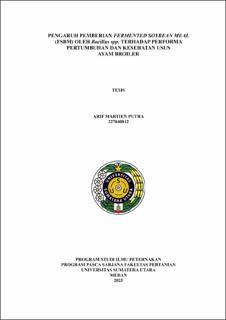Pengaruh Pemberian Fermented Soybean Meal (Fsbm) oleh Bacillus Spp. terhadap Performa Pertumbuhan dan Kesehatan Usus Ayam Broiler
The Effect of Giving Fermented Soybean Meal (FSBM) by Bacillus Spp. on Growth Performance and for Intestinal Health of Broiler Chickens

Date
2025Author
Putra, Arif Martien
Advisor(s)
Tafsin, Ma'ruf
Hanafi, Nevy Diana
Metadata
Show full item recordAbstract
Efforts to improve production efficiency in the livestock industry, such as improving ration quality and the use of additives, are an important focus of research. In the context of food safety, especially poultry products, the use of growth-promoting additives such as antibiotics has raised biosafety risks to human and animal health. The use of probiotics has been proposed as an alternative to replace the role of AGP (Antibiotic Growth Promoters). Several studies on probiotics, prebiotics, organic acids, and fermented feed have been conducted as alternatives to antibiotics in feed to improve poultry performance and health. This study aims to evaluate the effect of providing FSBM fermented by Bacillus spp. with a percentage of 0%, 1.5%, 2.5%, and 5.0%. The data taken in this study were growth performance evaluations including: Performance Index (IP), ADG (Weekly Weight Gain), Weekly Feed Consumption, FCR (Feed Conversion Ratio), and Depletion (Death). In addition, to measure the intestinal health status, data were taken on intestinal pH, relative small intestine weight including duodenum, jejunum, ileum, measurement of thickness and length of the small intestine and intestinal histology as well as checking the intestinal microbial profile including calculating the total bacterial colonies, testing lactic acid bacteria, gram test, catalase test and motility. This study shows that the use of fermented soybean meal (FSBM) in broiler chicken feed has a positive impact on several aspects of intestinal health and performance without significantly reducing feed consumption. FSBM increases the activity of supportive intestinal microbes, such as lactic acid bacteria, and increases catalase activity in the jejunum and ileum, which reflects a healthier intestinal environment. Overall, the provision of FSBM as much as 5% in broiler chicken feed has proven to be quite good, because it is able to increase nutrient digestibility and support the balance of intestinal microflora without having a negative impact on production performance. Further research is needed to determine the optimal dose of FSBM in order to obtain the best performance without reducing feed efficiency. With proper implementation, FSBM has the potential as an alternative feed ingredient that supports intestinal health and reduces mortality in broiler chickens.
Collections
- Master Theses [109]
